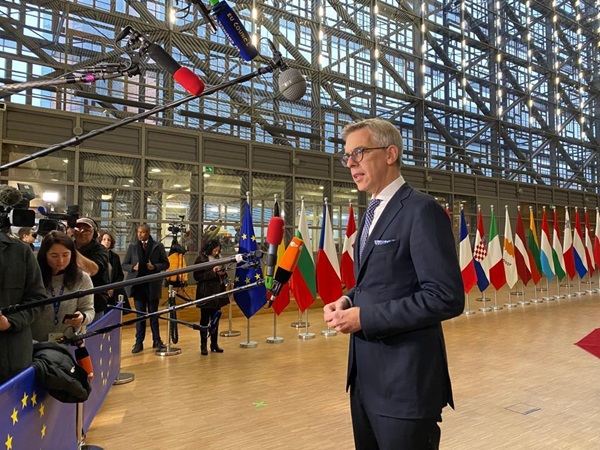 Luxembourg’s Minister of Home Affairs, Léon Gloden;
Credit: MAEE
Luxembourg’s Minister of Home Affairs, Léon Gloden;
Credit: MAEE
Luxembourg’s Minister of Home Affairs, Léon Gloden, participated in the meeting of the Justice and Home Affairs Council (JHA) of the European Union, which was held on Tuesday 5 December 2023 in Brussels.
Ylva Johansson, European Commissioner-designate for the Home Affairs portfolio, presented the Schengen Barometer on migration and security challenges to the ministers. The commissioner highlighted the importance of talent partnerships with Egypt, Morocco, Tunisia, Bangladesh and India, noting that more than 100,000 return decisions have been taken for these five developing countries. The conflict in Sudan and developments in the situation in Niger are likely to have repercussions in terms of migratory pressure on the external borders of the European Union, Luxembourg’s Ministry of Home Affairs noted. Commissioner Johansson confirmed that secondary movements within the Schengen area increased by around a third in 2023 compared to the previous year. Many speakers raised that reinforced police cooperation and migration management measures are essential to be able to preserve a Schengen area without internal border controls.
Minister Gloden stressed that “the Schengen area is one of the great achievements of the European Union, it must be preserved, and its maintenance also requires an effective fight against irregular immigration.” When it comes to returns, priority should be given to people presenting a security risk, the minister noted. Regarding return rules more generally, the minister commended the European Union and Member States for efforts to enhance readmission cooperation, noting initial positive results and new opportunities presented by the Commission. According to the minister, “these initial encouraging results open a window of opportunity to better equip ourselves internally. It will be essential to send more readmission requests to our partners in Third World countries”. He insisted that “if return does not work, the credibility of our entire European migration policy is at stake”. The minister also joined the call of several colleagues who stressed that it is also necessary to improve the existing rules of the Return Directive. Finally, Minister Gloden argued that in a common area of free movement like Schengen, mutual recognition is needed for asylum and return decisions. “It is not normal that in the event of a secondary movement from one Member State to another, we have to start the asylum and return procedures again each time.” A binding European legal instrument would put an end to the abuse of such procedures, he stressed. The Spanish Presidency has noted a broad convergence of views on the return policy. The council will continue in the short and long term the implementation of the various avenues discussed by the ministers.
Concerning the accession of Bulgaria and Romania to the Schengen area, the Council took note of the efforts presented by Commissioner Johansson in terms of migration management, deployed during the past year. The commission and the ministers of the two member states expressed their wish to no longer delay the decision-making on the lifting of internal border controls. Minister Gloden confirmed the need to enlarge the Schengen area to Member States which meet all the conditions, respect the acquis and protect sensitive external borders such as Bulgaria and Romania, a view shared by almost all Member States.
The security implications of the situation in the Middle East and Russian aggression in Ukraine were discussed during a working lunch. The ministers spoke in particular on the actions to be taken in the digital field to counter the dissemination of illegal content, or even “borderline” type content, and on the structured dialogue on security, initiated in September 2022 between the European Union and the Ukrainian authorities.
The JHA Council ended with progress reports on the external dimension of migration and the migration and asylum pact.
On the sidelines of the council, Minister Gloden met with Belgian Migration Secretary Nicole de Moor to discuss the future Belgian presidency. The two interlocutors agreed that they wanted to further deepen bilateral cooperation in the field of migration.








